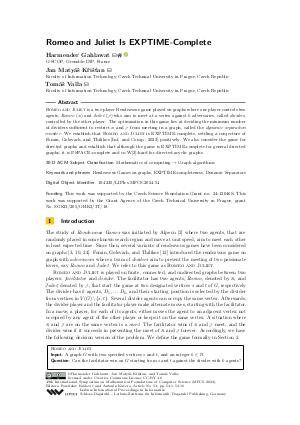Romeo and Juliet Is EXPTIME-Complete
Authors
Harmender Gahlawat  ,
Jan Matyáš Křišťan,
Tomáš Valla
,
Jan Matyáš Křišťan,
Tomáš Valla
-
Part of:
Volume:
49th International Symposium on Mathematical Foundations of Computer Science (MFCS 2024)
Part of: Series: Leibniz International Proceedings in Informatics (LIPIcs)
Part of: Conference: Mathematical Foundations of Computer Science (MFCS) - License:
 Creative Commons Attribution 4.0 International license
Creative Commons Attribution 4.0 International license
- Publication Date: 2024-08-23
File

PDF
LIPIcs.MFCS.2024.54.pdf
- Filesize: 0.85 MB
- 16 pages
Document Identifiers
Subject Classification
ACM Subject Classification
- Mathematics of computing → Graph algorithms
Keywords
- Rendezvous Games on graphs
- EXPTIME-completeness
- Dynamic Separators
Metrics
- Access Statistics
-
Total Accesses (updated on a weekly basis)
0PDF Downloads0Metadata Views
Abstract
Romeo and Juliet is a two player Rendezvous game played on graphs where one player controls two agents, Romeo (ℛ) and Juliet (𝒥) who aim to meet at a vertex against k adversaries, called dividers, controlled by the other player. The optimization in this game lies at deciding the minimum number of dividers sufficient to restrict ℛ and 𝒥 from meeting in a graph, called the dynamic separation number. We establish that Romeo and Juliet is EXPTIME-complete, settling a conjecture of Fomin, Golovach, and Thilikos [Inf. and Comp., 2023] positively. We also consider the game for directed graphs and establish that although the game is EXPTIME-complete for general directed graphs, it is PSPACE-complete and co-W[2]-hard for directed acyclic graphs.
Cite As Get BibTex
Harmender Gahlawat, Jan Matyáš Křišťan, and Tomáš Valla. Romeo and Juliet Is EXPTIME-Complete. In 49th International Symposium on Mathematical Foundations of Computer Science (MFCS 2024). Leibniz International Proceedings in Informatics (LIPIcs), Volume 306, pp. 54:1-54:16, Schloss Dagstuhl – Leibniz-Zentrum für Informatik (2024)
https://doi.org/10.4230/LIPIcs.MFCS.2024.54
BibTex
@InProceedings{gahlawat_et_al:LIPIcs.MFCS.2024.54,
author = {Gahlawat, Harmender and K\v{r}i\v{s}\v{t}an, Jan Maty\'{a}\v{s} and Valla, Tom\'{a}\v{s}},
title = {{Romeo and Juliet Is EXPTIME-Complete}},
booktitle = {49th International Symposium on Mathematical Foundations of Computer Science (MFCS 2024)},
pages = {54:1--54:16},
series = {Leibniz International Proceedings in Informatics (LIPIcs)},
ISBN = {978-3-95977-335-5},
ISSN = {1868-8969},
year = {2024},
volume = {306},
editor = {Kr\'{a}lovi\v{c}, Rastislav and Ku\v{c}era, Anton{\'\i}n},
publisher = {Schloss Dagstuhl -- Leibniz-Zentrum f{\"u}r Informatik},
address = {Dagstuhl, Germany},
URL = {https://drops.dagstuhl.de/entities/document/10.4230/LIPIcs.MFCS.2024.54},
URN = {urn:nbn:de:0030-drops-206106},
doi = {10.4230/LIPIcs.MFCS.2024.54},
annote = {Keywords: Rendezvous Games on graphs, EXPTIME-completeness, Dynamic Separators}
}
Author Details
- Faculty of Information Technology, Czech Technical University in Prague, Czech Republic
Funding
This work was supported by the Czech Science Foundation Grant no. 24-12046S. This work was supported by the Grant Agency of the Czech Technical University in Prague, grant No. SGS23/205/OHK3/3T/18.
References
-
M. Aigner and M. Fromme. A game of cops and robbers. Discrete Applied Mathematics, 8(1):1-12, 1984.

-
S. Alpern. The rendezvous search problem. SIAM Journal on Control and Optimization, 33(3):673-683, 1995.

-
S. Alpern and S. Gal. The theory of search games and rendezvous, volume 55. Springer Science & Business Media, 2006.

-
J. Barát. Directed path-width and monotonicity in digraph searching. Graphs and Combinatorics, 22(2):161-172, 2006.

-
D. Berwanger, A. Dawar, P. Hunter, S. Kreutzer, and J. Obdržálek. The dag-width of directed graphs. Journal of Combinatorial Theory Series B, 104(4):900-923, 2012.

-
A. Bonato. An invitation to pursuit-evasion games and graph theory, volume 97. American Mathematical Society, 2022.

-
A. Bonato and P. Pralat. Graph searching games and probabilistic methods. Chapman and Hall/CRC, 2017.

- P. Bradshaw, S. A. Hosseini, and J. Turcotte. Cops and robbers on directed and undirected abelian Cayley graphs. European Journal of Combinatorics, 97, 2021. URL: https://doi.org/10.1016/j.ejc.2021.103383.
-
S. Das, H. Gahlawat, U. k. Sahoo, and S. Sen. Cops and robber on some families of oriented graphs. Theoretical Computer Science, 888:31-40, 2021.

-
A. Dessmark, P. Fraigniaud, D. R. Kowalski, and A. Pelc. Deterministic rendezvous in graphs. Algorithmica, 46:69-96, 2006.

-
F. Fomin, P. Golovach, A. Hall, M. Mihalák, E. Vicari, and P. Widmayer. How to guard a graph? Algorithmica, 61(4):839-856, 2011.

-
F. V. Fomin, P. A. Golovach, and D. M. Thilikos. Can romeo and juliet meet? or rendezvous games with adversaries on graphs. Information and Computation, 293:105049, 2023.

-
F. V. Fomin and D. M. Thilikos. An annotated bibliography on guaranteed graph searching. Theoretical Computer Science, 399(3):236-245, 2008.

-
F.V. Fomin, P.A. Golovach, and D. Lokshtanov. Guard games on graphs: Keep the intruder out! Theoretical Computer Science, 412(46):6484-6497, 2011.

-
T. Johnson, N. Robertson, P. D. Seymour, and R. Thomas. Directed tree-width. Journal of Combinatorial Theory Series B, 82(1):138-154, 2001.

-
W. B. Kinnersley. Cops and robbers is exptime-complete. Journal of Combinatorial Theory Series B, 111:201-220, 2015.

-
P. Loh and S. Oh. Cops and robbers on planar directed graphs. Journal of Graph Theory, 86(3):329-340, 2017.

-
N. Misra, M. Mulpuri, P. Tale, and G. Viramgami. Romeo and juliet meeting in forest like regions. In 42nd IARCS Annual Conference on Foundations of Software Technology and Theoretical Computer Science (FSTTCS), 2022.

-
H. Nagamochi. Cop-robber guarding game with cycle robber-region. Theoretical Computer Science, 412:383-390, 2011.

-
R. Nowakowski and P. Winkler. Vertex-to-vertex pursuit in a graph. Discrete Mathematics, 43(2-3):235-239, 1983.

-
A. Quilliot. Thése d'Etat. PhD thesis, Université de Paris VI, 1983.

-
R. Šámal, R. Stolař, and T. Valla. Complexity of the cop and robber guarding game. In Combinatorial Algorithms: 22nd International Workshop, IWOCA 2011, Victoria, BC, Canada, July 20-22, 2011, Revised Selected Papers 22, pages 361-373. Springer, 2011.

-
R. Šámal and T. Valla. The guarding game is E-complete. Theoretical Computer Science, 521:92-106, 2014.

-
A. Ta-Shma and U. Zwick. Deterministic rendezvous, treasure hunts, and strongly universal exploration sequences. ACM Transactions on Algorithms (TALG), 10(3):1-15, 2014.

-
T. V. Thirumala Reddy, D. Sai Krishna, and C. Pandu Rangan. The guarding problem - complexity and approximation. In Lecture Notes in Computer Science, volume 5874, pages 460-470. Springer, 2009.

